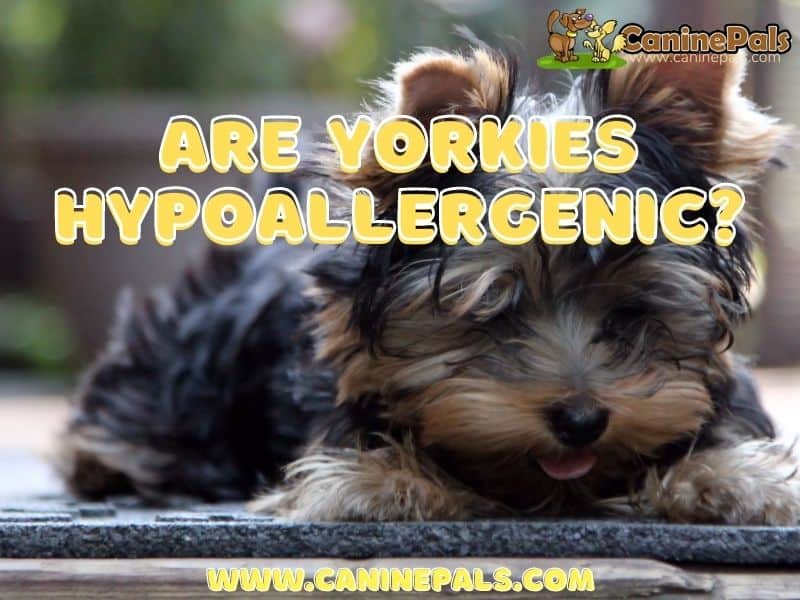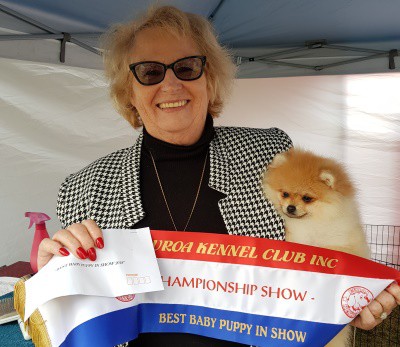Last Updated on March 20, 2024 by Denise Leo. Post first published on January 20, 2023.
According to a survey, more than 30% of people in the US suffer from a dog allergy each year. So what if you own a Yorkshire terrier? Will you suffer from allergies? Are Yorkies hypoallergenic dogs?
This article will give detailed answers to these questions, whether Yorkies are hypoallergenic and if this breed is right for you.
Allergies are the worst. It’s like your body is fighting itself every day, and you can’t escape this feeling of disgust all over the place. Allergy symptoms lead to a weakened immune system, making it easier to catch colds or asthma. However, we still have the power to control how much these conditions worsen by reducing allergens where possible.
Allergies suck because they feel really bad when you experience them, and they also seem impossible to avoid as there are tons of things that cause allergies.
A person’s immune system causes their symptoms and makes them more vulnerable to disease. Unfortunately, the rate of allergies also increases every year. A common allergy today is pet allergies.
While dogs or cats have been domesticated for centuries, they can still trigger an allergic reaction in some people, especially those with previous sensitivities from an early age, such as children. The immune response often leads to unpleasant symptoms that weaken our immunity against them.
Are Yorkies Hypoallergenic?
Yes, Yorkshire terriers are hypoallergenic. Yorkies have hair, just like humans, so they don’t shed seasonally, and there is less chance of your dog producing allergens. If you are allergic to dogs but love Yorkies, this must be great news.
Yorkies’s hair is not the source of the allergy. They are like human hair; they cannot cause allergies. Instead, allergens are saliva, hair fragments, odor and dander, and other items associated with your puppy’s life.
Another important characteristic of Yorkies is that they are dogs that do not shed hair. This means that there will be less hair loss and dandruff that you will find in your home compared to other dog breeds.

How Do Allergies Spread in Humans?
Some specific allergens trigger an allergy in dogs, but many environmental factors are worth considering. Dogs produce a large amount of waste and bacteria that can make life uncomfortable for people allergic to dogs or other animals. They also lose hair that has been found on clothing worn by people who later develop an allergic reaction after contact with their pets.
Dog allergies can be difficult because we don’t know specifically why some people react and others don’t. These common allergens are the main source of allergies in humans.
Saliva
Saliva is the other thing most people are allergic to. Saliva is normally present in dogs, and no matter how many times you brush your dog’s teeth, it will continue to appear in combination with bacteria.
Dog saliva is the germ factory and can cause dermatitis, itching, and other skin problems. Unfortunately, these problems cannot always be prevented.
Dogs have a habit of licking people, especially when they smell something delicious. This is also a gesture of affection on their part, and they sometimes do it when they find the remains of dinner on your hand.
By Dander
Dander is one of the main causes of allergies in humans. Dander is basically defined as dead skin cells, and it is like dandruff present in humans.
The dander that forms the fine dust-like particles on your pet’s fur is protein. These allergens are usually the ones that cause allergic reactions in people with pets at home.
The protein contained in dandruff can trigger this reaction and generally has negative consequences. In most cases, these proteins trigger bouts of sneezing or other symptoms associated with a fever-like illness.
Your dog’s dander will fall off and build up, making it a breeding ground for allergens. If you have allergies to pets or anything else in the house, such as dust mites, pollen, and fungal spores, these can all be present at higher levels due to this high concentration of loose skin cells.
Over time, your dog’s skin will dry out, leading him to shed old layers that need to be replaced with new ones every few months, based on his schedule. Once shed, they release dandruff into the surrounding hair follicles, where the bits are carried through the air and stick to everything around them.
Foreign Invaders
Some people think they are allergic to dogs, but they are not. They are basically allergic to the allergens that dogs bring when they go outside. Pollen is one example and only one type among many allergens that can cause such a problem for hypersensitive humans. Pollens often come from flowers, trees, and grasses.
Your dog may come from a long walk with pollen all over his coat. If you’re not careful, they shake or roll on the floor to get comfortable next time. They will spread more of those allergens around your house and mess up any allergies!
How are Yorkies Hypoallergenic?
Now that you have a basic understanding of how allergies occur in humans, we can discuss how Yorkies are hypoallergenic in nature. Yorkies have many physical traits that help with allergic reactions. They produce fewer allergens than other breeds, shed little hair, don’t drool or slobber as much as others, and stay clean by licking their paws frequently to remove dirt between the pads of their feet. Another feature that makes them less allergic for owners are
Low Dander Shedding
It’s hard to believe that a long-haired dog doesn’t also have dandruff. But, unlike furry friends who shed strands of hair and leave it on furniture or clothing, Yorkies release dandruff differently.
In other breeds of dogs, dander is released into the environment when the fur is shed from the body. In the case of Yorkies, dandruff is present at the root of the hair, and when one hair falls out, it sticks to the other root. There is less chance that this dander will be released into the environment and become airborne.
Human-like Hair
Yorkie’s unique coat makes this dog breed so different from the others. They are not covered with thick layers of fur like most breeds, but only a couple of layers of hair. These layers provide your Yorkie with insulation from hot and cold weather.
Other dog breeds have a fur coat with a thick undercoat that sheds throughout the year. Most breeds of dogs shed at different times of the year, and in that shedding period, the underlying skin layer is shed.
If you ever have a dog with thick fur, you will see that the fur will be shed at different times of the year. Most dogs shed their fur during the winter and summer seasons.
In the case of Yorkies, there is no need to worry that Yorkies have a special coat texture that other dogs do not have. The Yorkie’s coat is thicker and grows throughout the year, unlike most dog breeds’ thinner individual strands of fur.
Yorkies’ hair growth cycle is also different from other dog breeds. Their hairs do not grow or fall out like other dogs but grow continuously throughout the year, just like humans do, and fall out naturally.
Small Size
Yorkies are very small, meaning there are fewer dandruff problems. As you know, Yorkies produce dandruff, but the nature of that dandruff is different, and the structure of the hair makes it difficult for dandruff to be released into the environment.
The average height of the Yorkie is about eight to ten inches, which means that the dander they produce will be very low. The benefit of this small size is that it not only limits the amount of dander but also prevents it from spreading in the home.
Yorkies have very limited activity. Unlike large or medium dog breeds, Yorkies cannot jump on furniture and bed. Yorkies can get on your bed only if they get help. To spread dandruff, you need a pack of Yorkies to do.
No Hair Shedding
Yorkies are not only hypoallergenic, but they also don’t shed. This can be misleading as all the creatures with fur or hair will shed at some point during the year. Even humans lose hair throughout the year. However, due to their unique growth cycle and texture, they hardly need care to maintain a beautiful coat despite shedding. Yorkies almost always go unnoticed, while others try to keep up with cleanliness.
As you know, Yorkies have a different coat texture than other dog breeds. If you touch their hair, it will feel like human hair. The Yorkies’ hair growth cycle is different; the hairs grow almost all year round. Their hairs are completely different if you compare it with the fur that grows and is shed throughout the year.
You might think that a Yorkie doesn’t lose as much hair, but it does the same amount of hair as yours.
Some reasons for this are its small size and double coat. When you have shorter fur, like on the top of their head, they shed less than if they had long, shaggy fur that reaches down to their feet. You will see that some Yorkies have smaller hair while others have large hair, and it all depends on their genetic makeup. But once their hair reaches its maximum size, it will eventually fall out and new hair will grow.
This hair cycle continues throughout your puppy’s life. It is challenging to notice hair loss in Yorkies because they fall out at different times.
Another unique thing about Yorkie’s hair loss cycle is that all the hair falls back into the coat. All surrounding hairs trap loose hair and can only be physically removed.
Most Yorkie owners only notice hair loss when brushing or bathing their puppies’ fur. That is why it is recommended to groom them regularly. If you remove them in time, your home will remain dandruff-free and clean.
Non-Droolers
Yorkies are low-maintenance dogs. These puppies don’t drool unless they have a dental or health problem, so there will be no need to clean up after their messes. The only thing that can give you and your furniture an unwanted visit is their constant licking habit, but luckily you can change this behavior with a bit of behavioral training.

Are Yorkies Completely Hypoallergenic?
According to the American Kennel Club, no dog breed is entirely 100% hypoallergenic. Even the most hypoallergenic breed, like the Yorkies, still produces some allergens. If you are sensitive to allergens, you are likely to experience symptoms from time to time.
However, due to its small size and other characteristics, there is less chance of allergies to a Yorkie. Also, if you are allergic, you should take extra precautions to avoid allergies.
Is There Any Period of Excessive Shedding in Yorkies?
There is no suitable time in a year when Yorkies shed excess hair, but there are some situations where Yorkies shed more hair than usual. Most pregnant Yorkies lose more hair than normal due to hormonal changes. At some point, under certain health conditions and medications, the hair can fall more. If you find any of these conditions, see your vet right away.
What Are The Preventive Measures That Can Protect You From Allergies?
These are some of the measures that can protect you from dog allergies.
Proper Training
You want to do many things the first time your Yorkie comes home. You will need to establish some house rules, such as not licking your body and staying away from furniture that belongs to you.
Yorkies are very intelligent puppies. While they can have some rebellious tendencies, a Yorkie will catch up quickly and learn new tricks easily when given the proper training.
Your Yorkie will respond well to positive reinforcement. You should focus on good behaviors and praise them when they do something right, like sitting on command or lying next to you at your feet without jumping up for attention.
When training a puppy, it is essential to be gentle with him because Yorkies are known to be sensitive. So yelling at them won’t work! When they do something wrong, ignore that behavior instead of getting angry about it. Only then can we encourage better behavior in future attempts by giving rewards without punishment.
When you are new to training your puppy, it can be difficult and frustrating. But with a little help from professional dog trainers, the process will be easier for both of you. If you are frustrated, consult any professional trainer around you.
Regular Grooming
Grooming is an important part of a dog’s routine, and if you keep your dog’s coat clean, there will be less chance of dandruff-causing irritation. Unlike other breeds, Yorkies need to be groomed more often. However, if you are allergic to dogs, do not groom your Yorkie on your own but use the services of any professional groomer.
Professional groomers know how to style Yorkies’ hair. A groomer can also help keep their hair at the proper length—some owners like short hair due to allergies. With short hair, there is less chance that bugs and pollen will stick to your dog.
You can also use allergen-reducing products like conditioners and shampoos when grooming your Yorkie so that the skin remains hydrated and reduces dandruff’s fall.
Practice Good Hygiene
After spending a long day with your furry friend, it can be tempting to forget the basics, like washing your hands. But that’s never an option! Washing your hands after playing with or petting your dog will keep you and them healthy and safe from any harmful bacteria left on their fur.
It is also important not to touch your eyes or face if you cannot wash them immediately after contact. But don’t worry; there are many effective hand sanitizers for those who may find themselves in this position more often than expected.
Clean Your Home Regularly
It would be best if you took care of your dog, not only with grooming but also by keeping his environment clean. A minimum for house cleaning is once a week, especially where they spend most of their time or areas where you know they hang out and do their business, like in backyards, which means regularly picking up poop. You also have to vacuum your house to remove unwanted dandruff.

Are Yorkies Hypoallergenic Conclusion
If you are looking for a hypoallergenic breed of dog, Yorkies are a perfect choice. These puppies have an ultra-fine coat that is less likely to trigger allergic reactions in people with sensitivities than other breeds.
They also don’t shed a lot of hair and require minimal care, so they can be great pets for allergy sufferers who live in small apartments where space can be limited. We hope this article has helped you answer some of your questions about your favorite breed.
Copyright Caninepals.Com. All Rights Reserved.
References and Further Reading:


